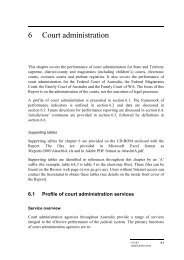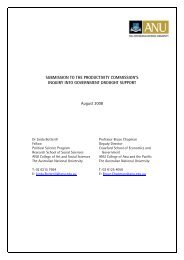7 Occupancy costs (PDF - 106 Kb) - Productivity Commission
7 Occupancy costs (PDF - 106 Kb) - Productivity Commission
7 Occupancy costs (PDF - 106 Kb) - Productivity Commission
Create successful ePaper yourself
Turn your PDF publications into a flip-book with our unique Google optimized e-Paper software.
through other means, it is not clear that prohibiting the provision of turnover data<br />
(or legislating the fashion in which it is provided) would materially affect<br />
occupancy <strong>costs</strong>. The <strong>Commission</strong>’s assessment is that the provision of turnover<br />
data, and its use by landlords should be the subject of commercial negotiation<br />
between the parties to a lease.<br />
FINDING<br />
Prohibiting the reporting of turnover data would be unlikely to lower average<br />
occupancy <strong>costs</strong>.<br />
Regulating shopping centre fit-outs<br />
A number of participants suggested that regulations governing shopping centre fitouts<br />
be established. Suggestions included controls on what landlords can request<br />
and caps on fit-out <strong>costs</strong>. One frequently suggested option was to mandate<br />
competitive bidding for fit-outs by prohibiting landlords requiring that tenants use a<br />
particular group of builders, architects and suppliers (sometimes in-house). What<br />
landlords can request of tenants in terms of fit-outs was also perceived as a<br />
particular issue for franchisees as it was felt that brand recognition was limited by<br />
some fit-out requirements.<br />
Prohibiting landlords from stipulating who can provide a fit-out for a retailer, and<br />
under what conditions, is likely to introduce greater competition into fit-out<br />
contracts. As long as fit-outs are consistent with a shopping centre’s design and<br />
relevant building and labour market regulations, it is reasonable to contend that the<br />
use of alternative builders, architects and suppliers to those recommended by the<br />
landlord may lower the <strong>costs</strong> faced by retailers. The achievement of lower fit-out<br />
<strong>costs</strong> could lead to a number of advantages, including:<br />
• a greater ability for tenants to amortise the cost of the fit-out over their fixed<br />
lease period;<br />
• lower set-up <strong>costs</strong> and thus the potential for lower debts or levels of personal<br />
guarantees for individual retailers; and<br />
• due to lower <strong>costs</strong>, a potential for lower prices to consumers and/or higher rental<br />
returns to landlords.<br />
But fit-out activity, as with any other construction, can be highly disruptive. Thus,<br />
landlords may legitimately seek to minimise these disruptions through mandating<br />
that tenants use preferred suppliers with, in their judgement, proven qualities and<br />
familiarity with the centre. Also, for those shopping centre-wide systems, such as<br />
security alarm systems, maintenance/installation by the nominated contractor may<br />
148 THE MARKET FOR<br />
RETAIL TENANCY<br />
LEASES IN

















